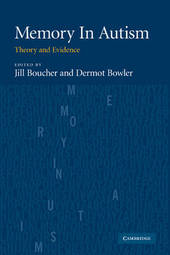
|
Memory In Autism: Theory and Evidence
Paperback / softback
Main Details
| Title |
Memory In Autism: Theory and Evidence
|
| Authors and Contributors |
Edited by Jill Boucher
|
|
Edited by Dermot Bowler
|
| Physical Properties |
| Format:Paperback / softback | | Pages:384 | | Dimensions(mm): Height 229,Width 152 |
|
| ISBN/Barcode |
9780521184014
|
| Classifications | Dewey:616.85882 |
|---|
| Audience | | Professional & Vocational | |
|---|
| Illustrations |
Worked examples or Exercises
|
|
Publishing Details |
| Publisher |
Cambridge University Press
|
| Imprint |
Cambridge University Press
|
| Publication Date |
16 December 2010 |
| Publication Country |
United Kingdom
|
Description
Many people with autism spectrum disorders (ASDs) are remarkably proficient at remembering how things look and sound, even years after an event. They are also good at rote learning and establishing habits and routines. Some even have encyclopaedic memories. However, all individuals with ASD have difficulty in recalling personal memories and reliving experiences, and less able people may have additional difficulty in memorising facts. This book assembles research on memory in autism to examine why this happens and the effects it has on people's lives. The contributors utilise advances in the understanding of normal memory systems and their breakdown as frameworks for analysing the neuropsychology and neurobiology of memory in autism. The unique patterning of memory functions across the spectrum illuminates difficulties with sense of self, emotion processing, mental time travel, language and learning, providing a window into the nature and causes of autism itself.
ReviewsReview of the hardback: '... a detailed and thorough review of research into memory in autism. It is the only book entirely devoted to this topic and one of the few books to focus exclusively on memory in any neurodevelopmental disorder.' Journal of Applied Cognitive Psychology Review of the hardback: 'As a resource for the investigator of memory in autism, or even cognition more generally, Memory in Autism is an indispensable tool.' Journal of the International Neuropsychological Society
|